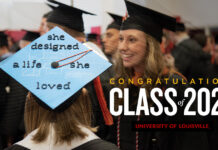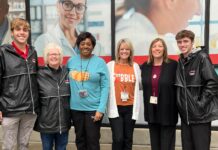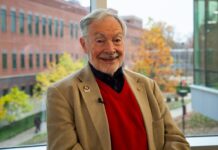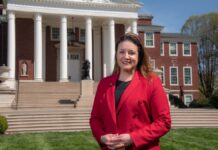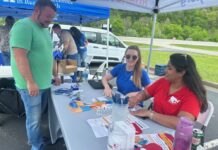
What do we not know about what we are doing for individuals with a disability?
Professor Oluwaferanmi Okanlami encouraged attendees to ask that question at the Research!Louisville 2024 health equity keynote: “Disabusing Disability: Demonstrating that Disability Doesn’t Mean Inability.” Okanlami, whose mission is to close the gap among the diverse members of our society to create a more equitable and promising future for all, highlighted shortcomings in how most of society views disabilities and what must change.
Born in Nigeria before immigrating to the U.S. at a young age, Okanlami attended high school at Deerfield Academy and went on to Stanford University where he also ran track & field, serving as captain his last two seasons and achieving Academic All-American recognition. Okanlami earned his medical degree from the University of Michigan before matching into orthopedic surgery residency at Yale University. At the beginning of his third year of residency, he experienced a spinal cord injury, paralyzing him from the chest down. After two surgeries and intense rehabilitation, he recovered some motor function and navigates the world as a proud wheelchair user.
Today, Okanlami is director of student accessibility and accommodation services at the University of Michigan, where he oversees the Office of Services for Students with Disabilities, two Testing Accommodation Centers and the Adaptive Sports & Fitness Program. He also is an assistant professor of family medicine, physical medicine & rehabilitation and urology at Michigan Medicine and an adjunct assistant professor of orthopedic surgery at David Geffen School of Medicine at UCLA. In addition, he earned a master’s in engineering, science and technology entrepreneurship from the University of Notre Dame and completed his family medicine residency at Memorial Hospital in South Bend, Indiana.
As an accomplished athlete, he is passionate about adaptive sports and fitness and champions access to physical fitness and inclusive recreational and competitive sports for all.
At Research!Louisville, Okanlami’s topic provided insight into creating a health system which is accessible to and inclusive of both patients and providers with disabilities, as well as providing provisions necessary for students and employees with disabilities in higher education.
The Americans with Disabilities Act defines a person with a disability as an individual who has a physical or mental impairment that substantially limits one or more major life activities, a person who has a history or record of such an impairment or a person who is perceived by others as having such an impairment. Okanlami’s work emphasizes that disabilities do not fairly identify individuals, but more than likely perceptions of disabilities can lead to artificially placing limits on people who have just as much or more to contribute to society.
As a disabled, Black, Nigerian, immigrant, cis-gender heterosexual, male, physician and athlete, Okanlami doesn’t just speak from an acquired knowledge-based perspective. He has experienced firsthand the difficulties of being identified in a culture that does not understand his main message that “disability does not mean inability.”
In his talk, Okanlami illustrated how each individual with a disability has unique needs for accommodations.
“When you have met one person with a disability, you have met one person with a disability,” he said.
Okanlami said that everyone must recognize that we live in an ableist world and we need to provide reasonable and appropriate accommodation for people that identify has having disabilities, whether those disabilities are visible or invisible.
“The health care system is ableist by definition. The medical model of disability teaches us that disability is pathology. It is something that is broken that should be fixed, prevented or cured,” Okanlami said. “The social model of disability does not see the problem living in the individual, it sees the system we are in as being inaccessible. If someone is born without the ability to walk, that shouldn’t be a problem if we have access to the resource they need to be able to navigate.”
But he encouraged everyone to take action.
“What is it we can do to make someone’s tomorrow better than their yesterday?” Okanlami said. “There is something that each of you can do, even if it is a tiny little bite, but the impact that little bite can have could be something that makes a profound impact on someone else’s life.”
Okanlami’s Research!Louisville presentation on Sept. 19 at the University of Louisville Health Sciences Center was led by the HSC Office of Health Equity and Engagement and the School of Medicine Office of Community Engagement and Diversity. To watch his entire keynote discussion, visit the recordings of R!L sessions.
Betty Coffman contributed to this story.













